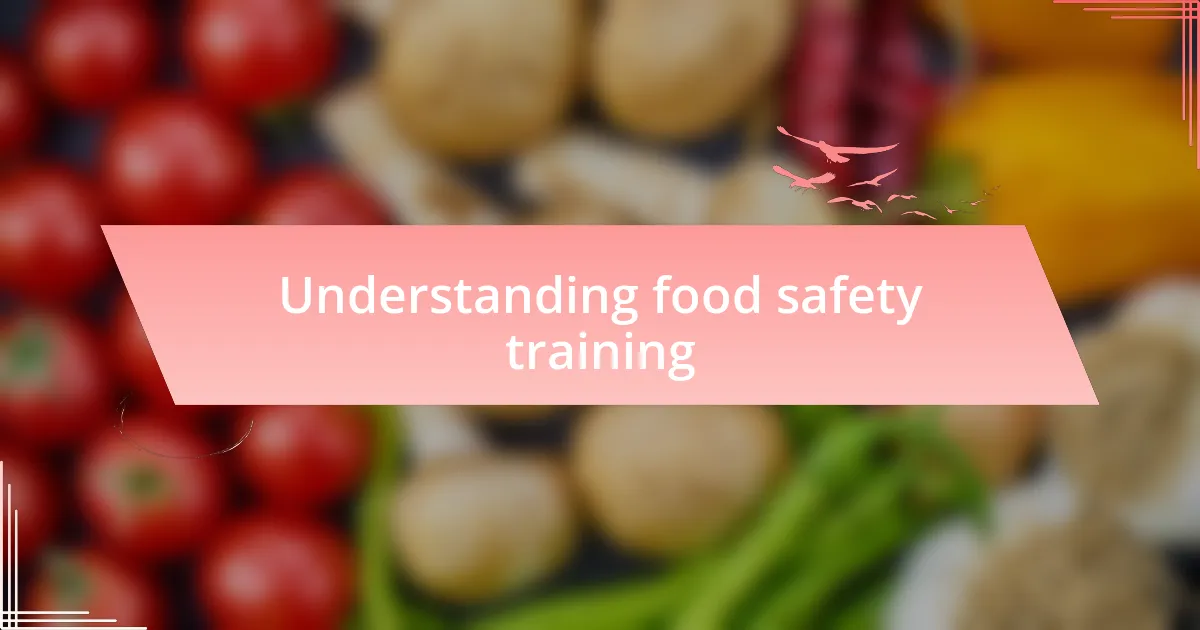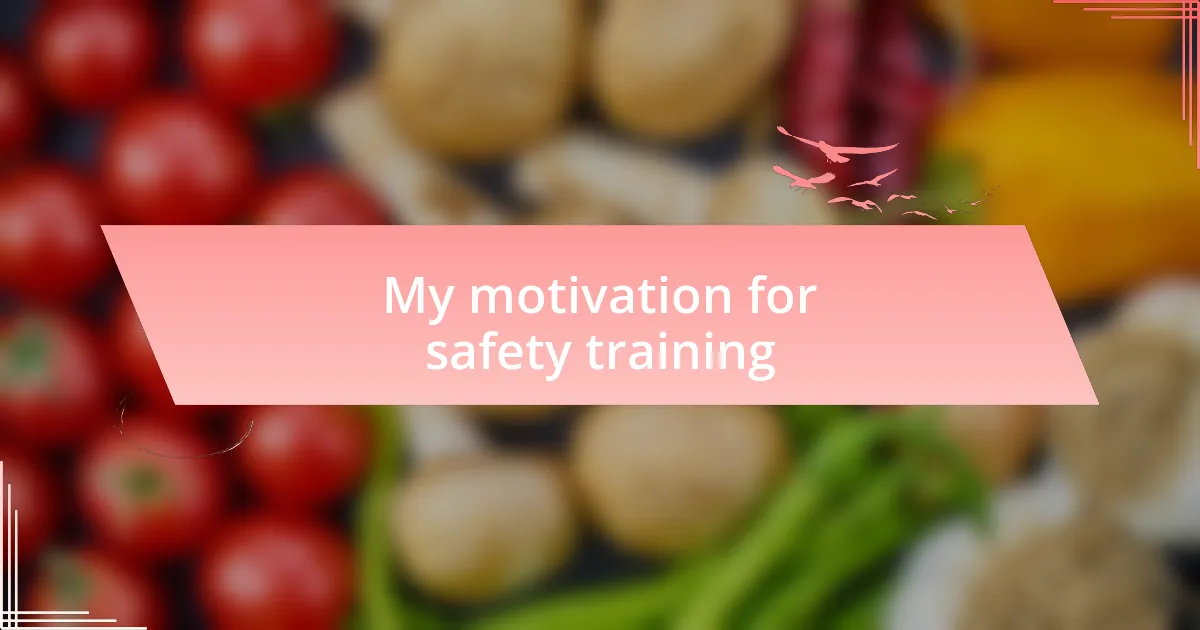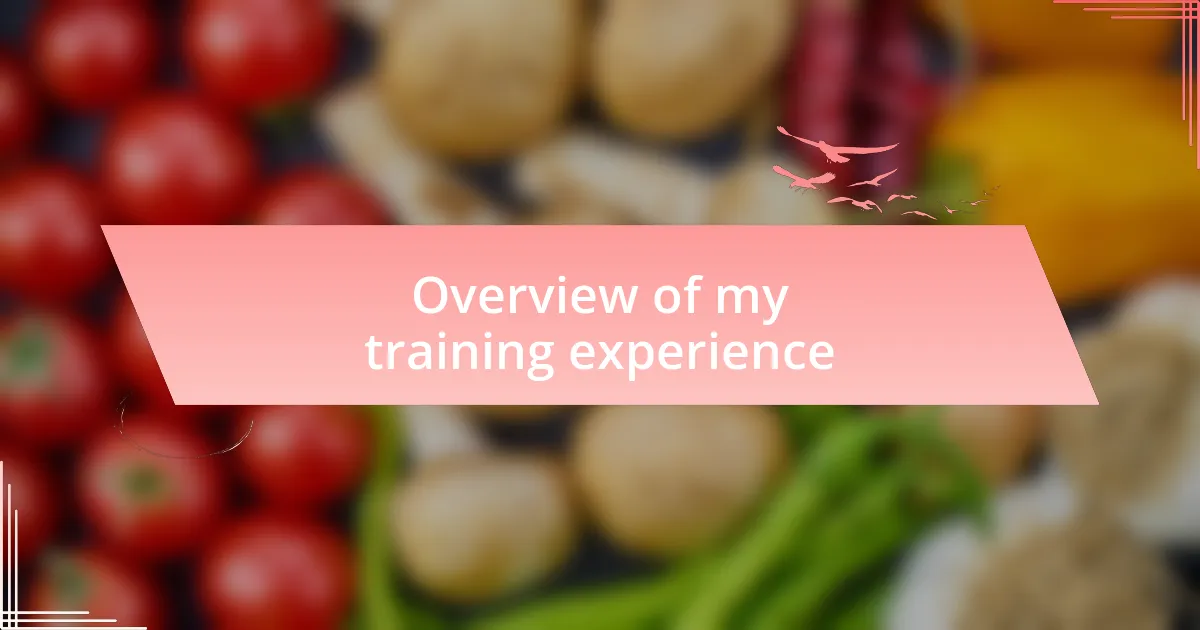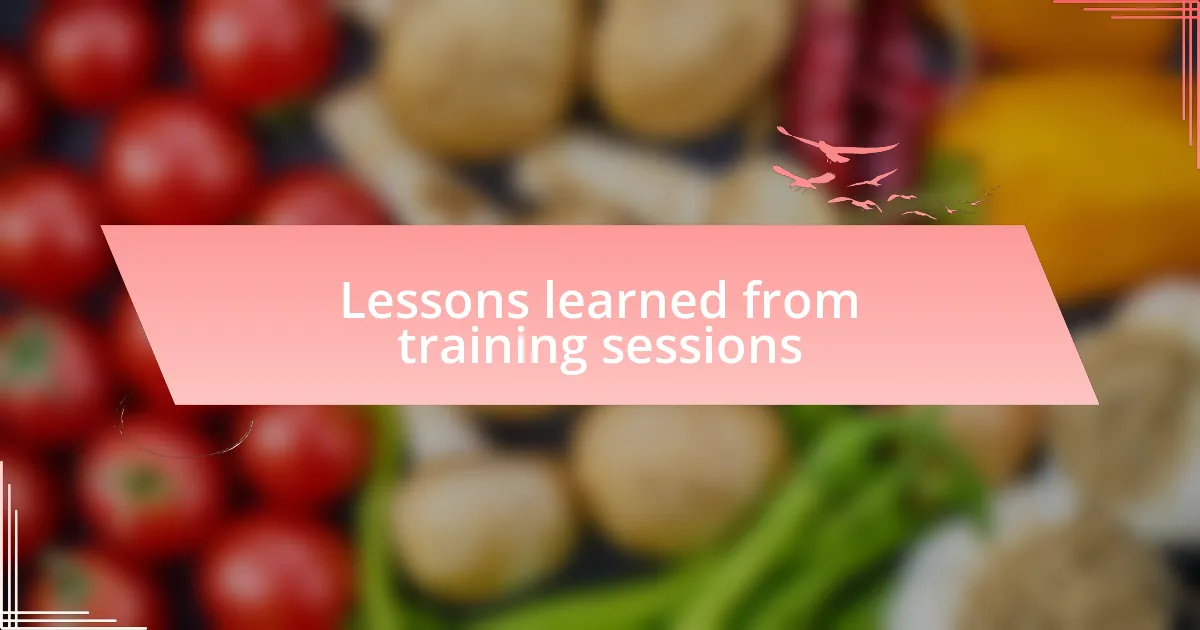Key takeaways:
- Food safety training is crucial for understanding safe food handling practices and preventing health risks associated with foodborne illnesses.
- Real-life examples of food safety failures highlight the importance of vigilance in maintaining high safety standards in food preparation.
- Hands-on training, such as proper handwashing and allergen management discussions, promotes empathy and responsibility among food handlers.
- Continuous education in food safety can significantly reduce the prevalence of foodborne illnesses and enhance community health awareness.

Understanding food safety training
Food safety training is essential because it equips individuals with the knowledge needed to handle, prepare, and store food safely. I vividly remember my first training session; the instructor discussed how a simple mistake, like leaving food out too long, can lead to severe consequences. It made me wonder – how many people are unaware that such small oversights could pose health risks?
During my training, I found it fascinating to learn about the science of foodborne illnesses. The statistics were startling—millions of people fall ill every year from contaminated food. This revelation struck a chord in me; I realized that understanding the “why” behind food safety procedures transformed my perception of cooking. Knowing that proper cooking temperatures are not just numbers but vital defense mechanisms made me feel empowered.
Additionally, food safety training often emphasizes the importance of ongoing education. One poignant moment for me was when we discussed real-life cases of outbreaks caused by careless practices. I couldn’t shake the feeling that we all have a role to play in preventing these incidents. It reinforced my belief that knowledge is power, and that making food safety a priority should be a shared responsibility in the food industry.

My motivation for safety training
The motivation for my safety training came from my early experiences in the kitchen. One afternoon, I was preparing a family meal and accidentally mixed raw chicken with fresh vegetables. My heart raced as I recalled a previous training session where we discussed cross-contamination. The thought of potentially making my loved ones sick was terrifying, and that moment ignited a passion in me to fully understand food safety protocols.
While attending a refresher course, I was struck by a powerful story shared by a fellow trainee. They recounted a time when a friend’s restaurant faced severe ramifications due to a minor lapse in food safety. The emotional weight in their voice conveyed the gravity of the situation and left me with an important question: how can we ensure that our passion for food does not come at the cost of health? That story became a catalyst for my commitment to maintaining high safety standards.
I often reflect on how critical food safety training is in shaping our collective responsibility. Imagine a world where every food handler was thoroughly trained; the prevention of foodborne illnesses would undoubtedly soar. This thought drives my dedication to continuous learning in the realm of food safety, reminding me that every little detail matters in preserving the well-being of those we serve.

Overview of my training experience
My food safety training experience was both enlightening and practical. I remember vividly the moment when we practiced proper handwashing techniques. As I rinsed my hands, it struck me how often I had rushed through this essential step in the past. This hands-on training reinforced the importance of simple actions that can prevent serious health risks.
During our sessions, I encountered a variety of case studies illustrating the consequences of neglecting food safety practices. One example involved a family that had unknowingly consumed contaminated produce, leading to a devastating outbreak. Hearing the details of that incident made it personal for me; I couldn’t shake the thought, “Could this happen to me or someone I care about?” It became clear to me that understanding these principles is not just about regulations—it’s about protecting lives.
Additionally, the interactive nature of the training allowed me to discuss scenarios with peers. I still think back to a discussion on allergen management, where a colleague shared their near-miss involving a guest with a severe food allergy. It made me question how often we overlook such critical details in our pursuit of culinary perfection. I realized that my training journey was as much about gaining knowledge as it was about fostering empathy and responsibility in the food industry.

Lessons learned from training sessions
The training sessions revealed how easily oversights can occur. I recall one day when we were taught about cross-contamination in the kitchen. It seemed straightforward until I realized I’d often used the same cutting board for raw meat and vegetables without thinking twice. This lesson hit home for me—what might seem like a minor lapse can have serious consequences.
One of the most striking moments was when an instructor shared a story about a foodborne illness outbreak linked to a seemingly innocuous deli. The sheer number of people affected was staggering, and I remember feeling a wave of concern wash over me. I thought, “What if one of my dishes contributed to such a situation?” It became evident that the stakes are incredibly high in food preparation.
Through discussions on food safety regulations, I came to appreciate their importance beyond compliance. One session highlighted how local inspections aren’t just bureaucratic obligations but vital checks for community health. Hearing personal stories from our trainers made me reflect on my role in the larger food ecosystem. It reinforced my commitment—ensuring my practices align with safety standards isn’t just about avoiding fines; it’s about making a real difference in people’s lives.